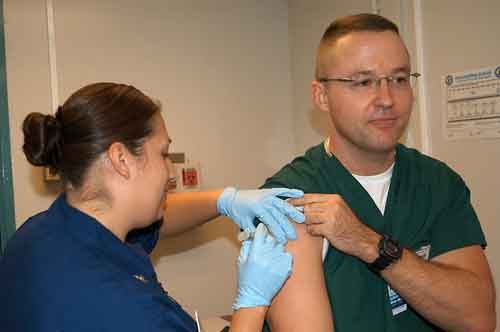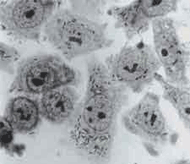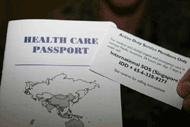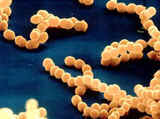Marine Headline News
Deployed
troops, health care workers, high-risk groups to receive flu
shots

CAMP
HANSEN, OKINAWA, Japan — Despite the shortage of the
influenza vaccine in the United States, military medical
officials here are developing a plan to vaccinate
servicemembers serving in certain, critical positions and
family members meeting specific medical and age criteria.
“The
U.S. government is trying to obtain additional vaccines, but
the process of development is so time intensive that the
likelihood of receiving additional doses (of the influenza
vaccine) remains low,” said Lt. Cmdr. J. Reed Pate, director
of Community Health for the U.S. Naval Hospital Okinawa.
It
is anticipated on Okinawa military installations that critical
operational force servicemembers, health care workers with
direct patient contact and people with high-risk medical
situations will be the only personnel vaccinated this flu
season, according to Pate.
Critical
operational forces include those forward deployed in support
of the global war on terrorism and in other high-security risk
areas as well as servicemembers who are preparing to deploy in
the near future.
The
critical operational forces also include servicemembers
underway for two or more weeks aboard a ship, personnel on
24-hour alert status and deployed DOD civilians in direct
support of operational forces.
High-risk
groups are defined as children, ages 6-23 months; military
beneficiaries, ages 2-64, with underlying chronic medical
conditions; otherwise healthy adults, 65 and older; all women
who will be pregnant during the flu season; residents of
nursing homes and long-term care facilities; children, ages
6-18, on chronic aspirin therapy; out-of-home caregivers and
household contacts of infants less than 6 months old; and
other military members in priority for deployment.
Various
orders have been distributed, listing different requirements
for receiving flu shots, but they are continuously being
updated. A clearer message will soon be released, according to
Pate.
“We
strive to provide the most current information to our
beneficiaries (about who can and can’t receive the flu
shot), but this year, the message has been very fluid and
continues to take shape,” Pate said. “We are coordinating
a unified message and procedures for everyone on (Okinawa) and
will release it as soon as it is thorough and precise.”
The
vaccine shortage is due to the fact that about half of the
influenza vaccine supply for the United States was rejected by
the British Medicines and Healthcare Products Regulatory
Agency Oct. 5. The health agency rejected 48 million doses of
the vaccine due to bacterial contamination and other
processing problems, according to Pate.
Those
who are otherwise healthy will be deferred, pending further
guidance, according to Lt. Cmdr. Colette A. Michaletz, head of
the USNH’s Preventive Medicine Department. They should,
however, prepare to protect themselves in other ways, such as
washing their hands, avoiding touching their faces, drinking
plenty of fluids, getting fresh air, not smoking or consuming
alcohol, and relaxing.
This
year’s vaccine shortage is unique in that the rejected doses
have never reached 48 million before, according to Pate.
Health officials are working with manufacturers to obtain
vaccines in a timely manner to prevent this problem from
occurring again.
Health
Care Passport
CAMP
FOSTER, OKINAWA, Japan
— Summer traveling throughout the Asian
Pacific is a popular practice among servicemembers stationed
on Okinawa. Whether
venturing solo, or with friends and family, travelers should
be aware of the health risks associated with the countries in
the region.
To
counteract the diseases, viruses and parasites that can be
caught, travelers need to take preventative measures before
visiting foreign countries.
“Servicemembers
and their families should research the country they are
intending to visit and read guidebooks on the areas they want
to travel to. If travelers have any questions or need preventative shots or
pills, they need to contact their primary care advisor,”
said Lt. Cmdr. James R. Pate, director of community health,
U.S. Naval Hospital, Okinawa.
For
servicemembers and families visiting countries in Southeastern
Asia, TRICARE provides a travel card that lists contact phone
numbers for emergency medical/dental care.
“The
TRICARE Travel Card provides an international SOS phone number
for servicemembers and their families who need emergency care
in foreign countries. As
long as they have a military identification card, the SOS
number will tell them what hospitals are approved by TRICARE.
Families don’t pay to use the hospital, all they do
is fill out the required forms and the fees are paid by the
military,” said Arlita McClintock, TRICARE marketing
representative, U.S. Naval Hospital, Okinawa.
The
number one illness that travelers catch is travelers’
diarrhea, which is contracted from drinking or eating food
contaminated with shigella bacteria.
“When
traveling through some of these Asian countries, drink only
bottled water and eat food from restaurants as opposed to
street vendors,” Pate said.
On
a recent deployment to Exercise Cobra Gold ’04, many Marines
caught travelers’ diarrhea.
“I
was in Thailand for 22 days, and 18 out of those 22 days I was
sick from eating something that was contaminated.
I was having cramps, nausea and cold sweats for most of
the time I was there. After
ten days of being sick, I went to the hospital and the doctor
gave me Imodium, but it didn’t work.
I had to wait it out and allow my body to fight off the
bacteria,” said Gunnery Sgt. Timothy Streaty, operations
training chief, Consolidated Public Affairs Office, III Marine
Expeditionary Force.
Another
common disease prominent in Asia is malaria, according to the
Centers for Disease Control and Prevention.
“What
many travelers do not know is many of the disease-carrying
insects are more active at night.
It is really important to use bug spray or wear long
sleeve shirts or pants. Make
sure you get the required pills and shots to prevent catching
this disease (malaria),” said Navy Lt. Uday Paul, staff
internal medicine, U.S. Naval Hospital, Okinawa.
Getting
the proper immunizations six weeks before traveling to the
country of destination is important but not as important as
making sure the medicine is taken properly, Pate emphasized.
“Travelers
should take their medicine until it is finished.
If they do get sick, they need to see their doctor and
inform them of their recent travels,” Pate said.
Third
World countries go through waves of epidemics.
Travelers should be prepared, which will help keep them
from getting sick, Paul said.
“There
are a couple of precautions to take when traveling, no matter
the destination,” Pate said.
“(Ensure you) wash your hands often with soap and
water and eat only thoroughly cooked food. Eat only fruits and vegetables that you have personally
peeled. There’s
a good saying to remember when eating foreign foods: boil it,
cook it, peel it, or forget it.”
Although
there are many precautions to take when visiting foreign
countries, the safety steps can help make your vacation more
enjoyable and memorable. After all, being sick while vacationing is no fun.
For
more information on what precautions you and your family can
take before visiting a foreign country, contact TRICARE at
643-7601 or research the CDC website at www.cdc.gov/travel.

A
close-up look of the malaria virus destroying the body’s red
blood cells. Malaria
is a leading virus in countries within Southeastern Asia, but
can be prevented by getting the proper immunization and pills
before traveling, according to Lt. Cmdr. James L. Pate,
director of community health, U.S. Naval Hospital, Okinawa.
(Courtesy Photo)
Mosquitoes
of Southeastern Asia are carriers of the malaria virus.
These insects are more active at night, and travelers
should cover up with long sleeve shirts and pants to help
protect against catching the disease.
Shigella
bacteria, commonly known as diarrhea, is the number one
illness among travelers in Southeastern Asia during the
tourist season. Wash hands often with soap and water and eat only thoroughly
cooked food.

CAMP FOSTER, OKINAWA, Japan -- The health care passport
(left) and international SOS card are available through
TRICARE for servicemembers and their families traveling to
Southeastern Asia. The
passport provides a list of military medical facilities
available in Japan, Guam and Korea.
The SOS card provides phone numbers for emergency care
in countries where no military medical facility is available.
Contact TRICARE at 643-7601 for more information.
(United States Marine Corps Photo by Lance Cpl. Rose A.
Muth) (Released)
USNH
Okinawa Combats Meningitis
CAMP
LESTER, OKINAWA, Japan — Several cases of meningitis occur
throughout the year on Okinawa, according to health officials
at the U.S. Naval Hospital, Okinawa.
Servicemembers
and their families are continuously exposed to bacteria and
viruses, which can cause any number of diseases. The warm
weather and humidity here creates a comfortable bed for these
unfriendly germs to grow, which can cause bacterial and viral
meningitis.
“During
the summer and fall, there are increased occurrences of
meningitis, particularly viral cases, as it tends to be a
disease more common in warm weather,” said Lt. Cmdr. Reed
Pate, director of Community Health, USNH, Okinawa.
Meningitis
is an infection of the membrane that covers the brain and
spinal cord. If caused by a virus, the body is able to
produce antibodies to fight the infection, and often
hospitalization is not required. Bacteria cause the most
serious cases and require intravenous antibiotics to treat the
infection, and treatment includes close monitoring in the
hospital. The signs and symptoms of meningitis include high
fever, headache, and stiff neck.
Newborns
and infants may appear lethargic, irritable, or lose their
appetite. A rash is also present in some cases but some
symptoms of headache and neck stiffness may be absent or
difficult to detect.
Although
there is a low everyday threat of contracting meningitis,
taking precautionary measures to prevent the spread of the
disease are encouraged, according to the preventive medicine
officials at the USNH, Okinawa.
“A
viral illness is usually spread through contact with
respiratory secretions (saliva, sputum, nasal mucus, etc.) and
may also be found in stool,” Pate said, “That is why good
hygiene and hand-washing are critical to preventing the spread
of meningitis.”
Hand-washing
will reduce the chances of becoming infected from many
contagious illnesses, ranging from the common cold to
meningitis. There are also vaccines available for certain
forms of the bacterial meningitis. It is important to be aware
of possible signs and symptoms of the disease and seek medical
treatment immediately if meningitis is suspected.
The
preventive medicine staff at the hospital track cases of
meningitis, and currently there have been fourteen cases
diagnosed. Staff physicians have determined that there is no
general public health threat related to any of these cases.
Air
Force Capt. Victoria Keegan, deputy chief, 18th Wing Public
Affairs, was 23-years-old when meningitis struck her life.
Although it was a fight, she made a full recovery from the
disease.
“It
was miserable,” Keegan said. “It was the worse sickness I
have ever had in my entire life. I felt my heart beat
pulsating throughout my entire body and had such a severe
headache. I truly thought my head was going to explode. I went
to the emergency room, and my temperature was over 102
degrees, and my pulse was something like 100. I had a spinal
tap, and they determined that I did have viral meningitis. I
received (intravenous) fluids, antibiotics and a three-day
hospital stay. All I can remember now was how miserable the
pain was and that I was very weak. I was emotionally drained,
irritable and physically exhausted.”
Anyone
at any age is potentially at risk for contracting meningitis.
It remains a very serious disease, which can be fatal under
certain circumstances, Pate added.
“It
is important to know that the viral form, which is most
common, is rarely fatal. Yet, the bacterial form in its worst
manifestation can result in disability or death.” Pate said.
For
further information, please contact your health care provider,
U.S. Naval Hospital Preventive Medicine Department at
643-7808, or Kadena Public Health at 630-4520. Additional
information is available at the Center for Disease Control
website: www.cdc.gov.

CAMP
LESTER, OKINAWA, Japan -- Meningitis is an infection of the
membrane that covers the brain and spinal cord. While viral
cases are not usually as serious, bacterial meningitis can be
life threatening. (Courtesy photo) Released
More on Marine
Corps Headline News